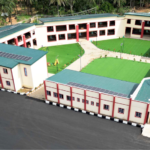- Home
- Features
- Startup Zone
- Projects
- Policies
- Shop
- Policies
- Projects
- Startup Zone
- Country Spotlight
- Analysis
- Tech
- Policies
- Projects
- Startup Zone
- Country Spotlight
- Analysis
- More
- Beyond the Kalashnikov: Africa’s Shift Toward Technology-Driven Warfare
- Afrail Express: Uniting a Continent on Rails
- AFRICA’S ENERGY CORRIDORS: CONNECTING POWER, PEOPLE, AND PROSPERITY
- Startup Lions Campus: Empowering Kenya’s Digital Generation
- L’Art de Vivre’s Le Paradis de Mahdia: Tunisia’s Model for Sustainable Luxury
- The Lobito Corridor: Rewiring Africa’s Trade Arteries Through Strategic Infrastructure
- AFRICA’S GREEN ENERGY TRANSITION: A BEACON OF HOPE FOR CLIMATE ACTION
- Dangote Refinery: Showcasing Africa’s Project Success Story
- AFRICA GREEN ECONOMY: ALL YOU NEED TO KNOW
- The Most Important Amicus Brief in the History of the World
- The Rise of Indigenous UAVs: Africa’s Drone Capabilities in Warfare and Surveillance
- AFRICA’S LARGEST OIL PRODUCERS: A COMPREHENSIVE OVERVIEW
- Beyond the Kalashnikov: Africa’s Shift Toward Technology-Driven Warfare
- Afrail Express: Uniting a Continent on Rails
- AFRICA’S ENERGY CORRIDORS: CONNECTING POWER, PEOPLE, AND PROSPERITY
- Startup Lions Campus: Empowering Kenya’s Digital Generation
- L’Art de Vivre’s Le Paradis de Mahdia: Tunisia’s Model for Sustainable Luxury
- The Lobito Corridor: Rewiring Africa’s Trade Arteries Through Strategic Infrastructure
- AFRICA’S GREEN ENERGY TRANSITION: A BEACON OF HOPE FOR CLIMATE ACTION
- Dangote Refinery: Showcasing Africa’s Project Success Story
- AFRICA GREEN ECONOMY: ALL YOU NEED TO KNOW
- The Most Important Amicus Brief in the History of the World
- The Rise of Indigenous UAVs: Africa’s Drone Capabilities in Warfare and Surveillance
- AFRICA’S LARGEST OIL PRODUCERS: A COMPREHENSIVE OVERVIEW
- Beyond the Kalashnikov: Africa’s Shift Toward Technology-Driven Warfare
- Afrail Express: Uniting a Continent on Rails
- AFRICA’S ENERGY CORRIDORS: CONNECTING POWER, PEOPLE, AND PROSPERITY
- Startup Lions Campus: Empowering Kenya’s Digital Generation
- L’Art de Vivre’s Le Paradis de Mahdia: Tunisia’s Model for Sustainable Luxury
- The Lobito Corridor: Rewiring Africa’s Trade Arteries Through Strategic Infrastructure
- Startup Zone
Top Insights
How Digital Transformation Is Reshaping Africa’s Supply Chains

Digital transformation is ushering in a new era for Africa’s supply chains, one characterised by greater efficiency, transparency, and resilience. As the continent increasingly adopts digital technologies, it lays the foundation for a more integrated, competitive economy. Key innovations such as artificial intelligence (AI), the Internet of Things (IoT), and blockchain are pivotal in this transformation, enabling businesses to enhance data management, streamline processes, and improve decision-making across the supply chain.
Embracing Digital Innovation
Africa’s supply chain sector is witnessing a seismic shift driven by the swift adoption of digital technologies. These innovations are not only reshaping traditional processes but also equipping businesses with tools to enhance productivity and sustainability, ultimately positioning the continent for long-term growth and competitiveness in the global market.
READ ALSO: Africa’s Digital Backbone: The Fibre-Optic Projects Powering 21st Century Growth
AI, for example, allows companies to harness large datasets to make data-driven decisions, optimise inventory levels, and accurately forecast demand, thus reducing costs and improving service quality. IoT, with its real-time tracking capabilities, ensures safe and efficient transportation of goods, while blockchain technology enhances transparency and traceability, significantly reducing risks of fraud and ensuring the authenticity of products.
Proving the Value of Digital Advancements
The benefits of digital transformation in Africa’s supply chains are manifold. Automation and data analytics are streamlining operations, which results in reduced costs, optimised inventory management, and quicker delivery times. Businesses are now able to align their stock levels with actual market demand, minimising both overstocking and shortages and enhancing overall profitability.
The pandemic highlighted the importance of supply chain resilience. Companies that implemented digital technologies were better prepared to manage disruptions, leveraging real-time data to adapt swiftly to changing circumstances. This adaptability has become vital in maintaining competitiveness, especially as global markets continue to evolve.
Challenges to Overcome
While the digital transformation of Africa’s supply chains shows immense promise, several challenges must be addressed. One of the most pressing issues is infrastructure limitations, particularly in rural and remote areas where internet access and reliable power supply can be scarce. Additionally, there is a significant need for skilled professionals capable of managing and operating complex digital systems.
To harness the full potential of digital technologies, collaboration between businesses and governments is essential. Engaging in investments that improve infrastructure and offering education and training programs will be crucial in building a digitally literate workforce.
Transformative Technologies in Action
The integration of technologies like blockchain, AI, and IoT is already yielding concrete results. For instance, in the agricultural sector, blockchain provides enhanced traceability, ensuring that products like coffee and tea are sourced sustainably and are free from fraud. In South Africa, IoT technology is being employed in cold chain logistics to monitor conditions for temperature-sensitive products, safeguarding their integrity during transport.
Additionally, logistics startups such as Nigeria’s Kobo360 are harnessing AI to optimise transportation processes, enabling freight owners to connect swiftly with available trucking services, thus reducing costs and delivery times.
The Road Ahead
Despite existing barriers, initiatives like the African Continental Free Trade Area (AfCFTA) point toward a more integrated and digitalised future. The implementation of extensive 5G networks across the continent will further enhance connectivity, empowering IoT devices for real-time monitoring across supply chains.
As Africa continues to adopt innovative solutions, its businesses are crafting more efficient, sustainable, and resilient supply chains. This shift represents a pivotal moment for the continent, unlocking numerous opportunities for growth and establishing Africa as a formidable player in global supply chain solutions.
Digital transformation is reshaping Africa’s supply chains, steering the continent toward increased efficiency and competitiveness. By leveraging advanced technologies like AI, blockchain, and IoT, businesses are not only improving their operational capabilities but also positioning themselves favourably in a dynamic global market. The successful integration of these digital strategies depends on overcoming existing challenges, particularly in infrastructure and skills development. With collaborative efforts, Africa stands at the dawn of a new era in supply chain management—one that fosters innovation, drives growth, and enables resilience in an ever-evolving landscape. As African businesses continue to embrace this digital revolution, they are well on their way to establishing a robust and sophisticated supply chain ecosystem that can support sustainable economic development across the continent.
Recent Posts
Related Articles
Solar-Powered Industrial Parks: Driving Hybrid Energy Manufacturing Growth in Africa
As Africa faces rising energy demand, climate pressures, and persistent industrialisation gaps,...
ByafricaprojectFebruary 2, 2026Digital Government: E-Governance Infrastructure Modernizing Public Services
Digital government has become a cornerstone of public sector reform as states...
ByafricaprojectJanuary 27, 2026Science & Technology Parks Fueling Continental Innovation
Science and technology parks have become vital engines of innovation, industrial transformation,...
ByafricaprojectJanuary 26, 2026Mining Logistics Infrastructure: Expanding Railways, Ports, and Processing
Mining remains one of Africa’s most critical economic sectors, supplying the world...
ByafricaprojectJanuary 21, 2026












